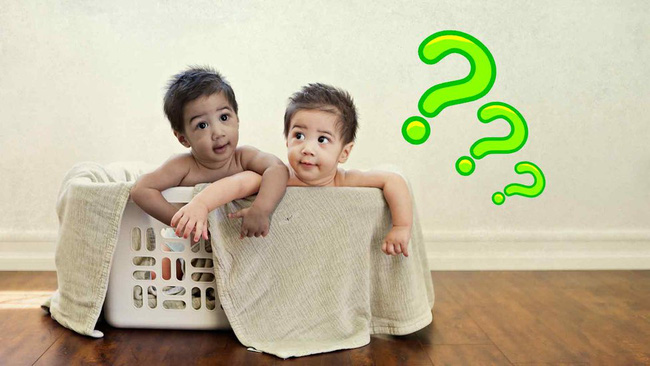What the hell can happen: Women can continue to conceive even while pregnant
Biological knowledge of all of us turns out to be wrong until now.
So far, all of our views on reproductive health are: Women who are pregnant cannot continue to conceive.
But according to a New York Times question and answer program, this turned out to be possible. Accordingly, in certain cases, pregnant women can continue to fertilize another child.
This phenomenon is called " heterozygous fertilization ", when a woman can nourish two fetuses at the same time, but different stages of development.

For example, in 2009, a couple from Arkansas (USA) continued to become pregnant after having had good news from the past two and a half weeks. Both children were born on December 2, but a baby showed signs of development two weeks earlier than the other.
Or as in 2015, an Australian mother gave birth to two girls, but the children developed a difference of 10 days.
So are couples starting to worry about planning from now on? In fact, aneuploidy fertilization is a very rare phenomenon. According to research from 2008, only 10 such cases were officially recognized, since the first scientific documents appeared.
But in the end, why is this phenomenon?
In fact, heterozygous fertilization is relatively common in mammals such as rabbits, horses, sheep, kangaroo and other rodents.
Even some individuals have up to 2 uterus to nourish the twins. Other menstrual periods continue to occur even though the fetus in the abdomen is growing. This is considered a very convenient reproductive strategy of many animals.
But in humans, heterozygous insemination is an extremely rare phenomenon. The reason is because during pregnancy, the woman's body releases hormones that "block" the ability to continue pregnancy.
" Normally, ovulation will stop when a woman is pregnant. The hormones secreted also make it impossible to conceive " - C. Clairborne Ray - obstetrician answers New York Times.

So it's just about getting pregnant with two children, each of a different father
However, some women continue to ovulate. If the relationship continues at this time, along with some other conditions, the egg can be fully fertilized, creating the second zygote.
" For heterozygous fertilization, three impossible things are required. The egg must continue to fall, the sperm must pass the fallopian tube that has been sealed after conception, and finally the pregnancy is formed. even when the uterus was "occupied" earlier. "- Professor Khalil A. Cassimally presented in a study in 2011.
Other twins have multiple pregnancies, and it has potential risks
These are not twins. The twins are only used when a fertilized egg is split into 2, or 2 eggs are fertilized at the same time. For heterozygous fertilization, the fetuses, though born at the same time, have different stages of development.
This period is usually a few weeks, no record of overcoming.

As a result, heterozygous conception pairs are more likely to suffer from deformities such as twins. However, because babies are fertilized on another day but are born at the same time, it has the potential for one of the two to be born prematurely, causing the ability to survive birth.
According to Casimally, it is unclear what factors may increase the risk of heterozygous fertilization. But as noted, the cases of artificial insemination for infertility are most common.
- Explain the science behind the pregnant woman's curious appetite
- Eating breakfast helps increase your ability to conceive
- Women who drink a lot of coffee find it difficult to conceive
- Pregnant women with Rubella infection are at risk of conception
- Visit hell 'frightened' of ancient people
- Pregnant women today are more susceptible to depression and anxiety than the older generation
- How to cure hemorrhoids for pregnant women
- Why do rural women often give birth to larger children?
- Discovered 3,700 year old remains of women about to give birth in Egypt
- Which age women are easily pregnant?
- Eating fish helps pregnant women reduce stress
- Most pregnant women lack vitamin D
 'Fine laughs' - Scary and painful torture in ancient times
'Fine laughs' - Scary and painful torture in ancient times The sequence of numbers 142857 of the Egyptian pyramids is known as the strangest number in the world - Why?
The sequence of numbers 142857 of the Egyptian pyramids is known as the strangest number in the world - Why? History of the iron
History of the iron What is alum?
What is alum?